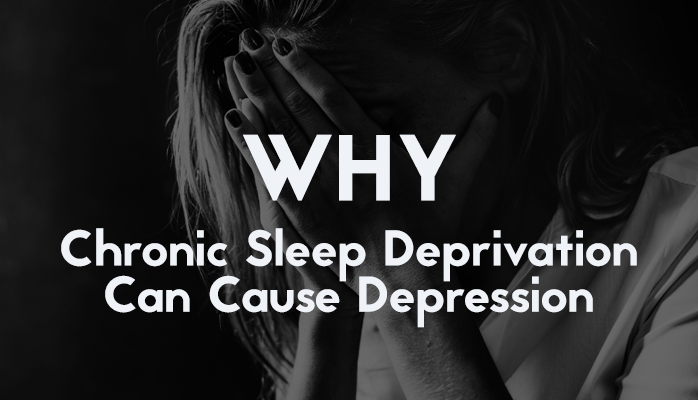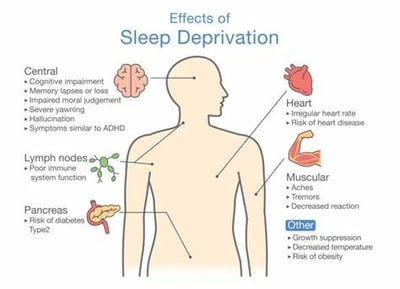Cant Sleep Continuous Sleep Deprivation Cause Depression
Clinical depression is a mood disorder that causes you to feel helpless, apathetic to your life and outcomes, hopeless, numb, or sad, among other things. It can make it hard to get out bed in the morning, feel excited about things that are happening in your life, or cause you to distance yourself from friends and loved ones. While feeling sad is a normal part of being a human, the feelings associated with clinical depression are chronic and intense enough to interfere with relationships, personal habits, personality, jobs, and so on. Sleep deprivation is simply the condition of not getting enough sleep. "Enough sleep" will be different for each person, and our need for sleep changes as we age. Most of us suffer from sleep deprivation because we either have trouble staying asleep, or getting to sleep. How is your sleep schedule? Are you getting enough sleep? If you are like 33% of Americans, you aren't. (CDC-sleep) It's important to distinguish between shorter term sleep troubles, such as sleep deprivation causes by anxieties or stress that will soon pass, and long term sleep deprivation, such as a chronic lack of sleep that may spread over months or years and can be caused by sleep disorders or medical conditions. Getting enough sleep is critical for your ability to have the emotional energy to manage stress and anxiety. Sleep deprivation can hamper your ability to manage stress and anxiety, which in turn can reduce your ability to get rest. Chronic stress and anxiety are a frequent mainstay in depressive symptoms. Chronic sleep deprivation means chronic fatigue, and usually, a lot less exercise. Who wants to work out when you barely have enough energy to digest your own food? Exercise plays a critical role in maintain physical, mental, and emotional health. Feeling sluggish and not getting exercise can exacerbate depressive symptoms. You perform worse in every aspect of your life when you are sleep deprived – at work, in school, physically. Underperformance can be a significant source of chronic frustration that may lead to feelings of hopelessness, worthlessness, or apathy. Anyone who has experience with toddlers learns how to tell when the toddler needs sleep – they start getting crabby. Adults are no different. When we are tired we have less patience, less self control, and a lower threshold for being "okay with things." Chronic tiredness usually means chronic irritability, which can make you rather unpleasant to be around, thus interfering with your relationships. Chronic fatigue from sleep deprivation not only affects your drive to work out, it also affects your energy for engaging in other things that make you feel happy. These are generally hobbies and other non-work, non-school activities, such as any number of creative pursuits. What many of the above points amount to is that chronic sleep deprivation can make you feel "abnormal," less like yourself, a "worse" version of your normal self, and so on. Over time, these feelings and physical symptoms of sleep deprivation can weigh on our emotional and physical vitality. Alone or compounded with other symptoms, this can lead to depression. Sleep deprivation can occur to anyone at any age, including: Sleep disorders, physical, and hormonal changes do not discriminate. Sleep apnea is more common in men, but insomnia is more common in women. Puberty and menopause are extremely disruptive hormonal changes that affect both sexes at very different ages. That being said, as we get older we naturally go through changes in the way we acquire requisite sleep - changes that generally leave people feeling like they are not getting enough sleep. Commonly expected ranges of sleep we need are [National Sleep Foundation]: Of course, we are all individuals and your sleep requirements may differ from these. These are simply some guidelines. The first thing you might consider doing is consulting with your doctor or a sleep specialist, who may be able to help determine if your sleep deprivation is caused by a sleeping disorder or other factors. If you live in Alaska and suffer from chronic sleep deprivation and depression, please contact us one of our sleep specialists for a consultation.

What is Clinical Depression
What is Sleep Deprivation
How Sleep Deprivation Can Contribute to Depression
Less able to manage stress and anxiety
Less likely to get requisite exercise due to fatigue
Underperform at work, school, etc.
Chronic irritability that can interfere with relationships
Less engagement in activities
Feel less like yourself
Who is at Risk for Sleep Deprivation?

How Much Sleep Do We Need?
What to Do If You Are Chronically Sleep Deprived

Source: https://info.ancsleep.com/blog/why-chronic-sleep-deprivation-can-cause-depression
0 Response to "Cant Sleep Continuous Sleep Deprivation Cause Depression"
Post a Comment